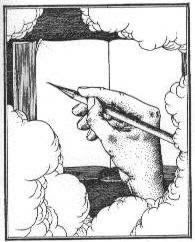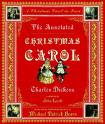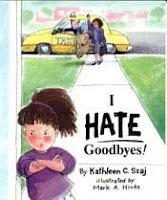
"Every person is born into life as a blank page—and every person leaves as a full book." —Christina Baldwin
How did it happen? I really did not intend to write a children's book about my grandmother.
Instead, I was quite sure that my story would gently tug at a knotty dilemma I was noticing among little kids (especially girls) who one day suddenly hate the name given to them by their parents.
Especially if the name was old fashioned (read: not cool), the name of a relative (read: ancient) rarely seen, or worse, not even living. A name sometimes worn with embarrassed sighs or impatient eyes. A name like Stella.
My story also meant to glance at celebrity worship, which so many kids (and adults!) fall into, a quicksand of media-painted appearance, pedestaled performance, and ego-driven behavior—none of which remotely resembled my grandmother Stella.
Stella never won (or competed for) celebrity babe status. Never performed for anyone—unless feeding freshly baked bread/cakes/pies/donuts or myriad cooked dishes to anyone who crossed her home's threshold qualified as performance. As for ego driven, she was too busy spotting even a smidgen of appetite in visiting family and friends, no matter what time they arrived, to care about something she could do for herself, such as relaxing for ten minutes.
To my surprise, the story I began writing about unwanted names and celebrity veneer also became a story about my grandmother, Stella Kowalski Szaj, who died some eighteen years ago. A story beyond the facts (Oct. 12, 1895 - June 30, 1992) of her to the truth of her.
Decades ago, I used to tell my high school students that we need stories whenever we want to tell a truth that is bigger than fact. (Huh? Bigger than fact? Aren't stories just harmless fantasies?) I told them that a story tells truths that facts can't begin to touch, often about love or its opposite, fear. I wanted them to know something I finally knew: Story is for close-encounter truth.
Since then I've learned that telling close-encounter truth about a beloved family member or friend takes paying awesome attention, which kicks us out of orderly, chronological fact-land and sweeps us into the territory of entangling relationship. Truth, formerly the only child of Either/Or ("Either it's true or a lie," we often tell children), now multiplies into triplets: True, Truer, Truest.
And for me, telling the truest stories about our people especially means revealing how they unwrap their deep gladness gifts—and nourish the world, hungry to receive them.
Truer: Grandma enjoyed watching us eat up her offerings.
Truest: Grandma's feeding us, me, was her language of "I love you." I learned and now speak "Stella," sometimes with food, often with words.
In my story, Stella Means Star, a little girl named Stella, who hates her name, experiences close-encounter truth about her great-grandmother—a "meeting" that begins adding tiny sparkles of pride to her name tag.
To my delight, Stella Means Star also tells the truth about my grandmother: the essence of who she was then, and how she still lives now...in me.
Come, cross this threshold. You just might remember someone gone or far away who still, in truth, lives...soulfully in you.

Story is the narrative thread of our experience—
not what literally happens,
but what we make of what happens,
what we tell each other and what we remember."
—Christina Baldwin
not what literally happens,
but what we make of what happens,
what we tell each other and what we remember."
—Christina Baldwin

Stella Means Star
When I grow up, I'm going to change my name.Or maybe I'll change it when I'm nine.
Then, when my mother says, "Stella, please come set the table," I'll have to stay sitting on my chair, reading my book, because I won't be STELLA anymore. Then, when she says, "Stella, please set the table" again, I'll have to finish my story because STELLA isn't my name anymore.
When Mommy says, "Stella, didn't you hear me? I asked you to set the table now," I will have to tell Mommy that (I am sorry to say) STELLA didn't hear her, because STELLA doesn't live here anymore.
Of course, I COULD change my name when I'm eight.
Then, on the first day of school, when my new teacher calls the name of everyone who's supposed to be in my class, no one will answer when she calls, "Stella? Raise your hand, please. Are you here?"
Everybody knows you shouldn't raise your hand and say "present" for the wrong name. I suppose that's when I'll have to tell her that STELLA doesn't go to this school anymore.
I might change my name tomorrow, on my birthday, when I'll be seven.
Then, when I meet that new girl I saw who is moving into the apartment building across the street, I will say, "Hello, my name is Cassandra. Or Belle. Or Jasmine. Or ArielLouiseSuzanne. What's yours?" (Her name WON'T be STELLA, either.)
This morning, my daddy found me copying names from some books for older kids that have lots of good names in them. I practiced writing some name I like: "Paloma"..."Guinivere"..."Amelia."
Daddy asked me if I was writing one of my super stories. I almost said, "Yes, I am," even though I really wasn't. I didn't want him to know that I didn't want my name anymore. I didn't want to hurt his feelings. So I said very fast, "No-I'm-finding-a-new-name."
Daddy asked me if the new name was for a school project. "Not exactly," I said.
For one of my dolls or stuffed animals then? "Not exactly," I said.
A pretend name for me or one of my friends? "No, Daddy," I said, "A real name...a new name for me."
Daddy looked at me without saying anything for a long time. I looked down at the names I wrote and wished I were invisible.
Daddy asked me if I knew why he and Mommy named me "Stella." I said, Yes, because it was the name of his grandmother, which means she was my GREAT-grandmother. He said Yes, and that he had loved her a lot. I said, I know that, but....I stopped talking. I didn't want to tell him.
But Daddy waited and waited.
I took a big breath and said I didn't want the name STELLA anymore because nobody almost seven years old had that name...and because kids at school were always saying stupid things like "Stella Stella, Let's all yella, Stella Stella..." and because it's not a beautiful name like "Paloma" or "Natasha" or a special name like "Guinevere" or "Indigo" or a brave name like "Amelia" or "Pocahontas"...and because even though Stella was Great-granny's name, she died before I was even born.
Daddy looked surprised, like people do when they find out they're accidentally wearing two different socks. Then he said Thank you, and that now he understood. He asked me if it would help to have my very own picture of the other Stella. I didn't think so, but I said okay.
He asked
Mommy did and gave me this photograph with no color. I said thank you and stared at the lady in it.
She had curls in her hair that covered only one ear and touched her shoulder. She wore some kind of fancy dress, and was holding some flowers, and smiled a little.
I told Daddy and Mommy that Stella looked kind of pretty, and maybe a little bit shy, but not really beautiful or special or brave. Mommy said, Oh, but Stella was all of those things.
She was special because she was gentle, kind, and generous. She never said anything awful about anyone, and she was always feeding lots of friends and family who dropped by her house, no matter what time of day or night they came.
She was especially brave when two of her sons, who were only a little more than twenty years old, died in the same horrible war, one right after the other.
And all of these things made her very beautiful, Daddy said.
I didn't say anything else because I knew I had to think about Stella some more.
* * *
Tonight, I put Stella's picture on the table next to my bed.I peeked at her just before I took my bath to see if she looked beautiful, like Daddy said.
I peeked at her again while I put on my pajamas to see if she felt special to me yet.
I peeked at her once more just before I climbed into bed to see if I could tell how brave she was.
She was still giving me her little smile.
THEN, I remembered something very important.
I jumped out of bed, ran to the den, and took down our huge dictionary from the bookshelf. Mommy was always saying that a dictionary could tell you lots of interesting things. But could it tell me about "Stella"?
I turned the pages as fast as I could, past the G's, the S's, and the Z's. Past the names of American presidents, faraway places, and famous artists. Then I found the names of people. There it was: "Stella"—a name that means "star."
STAR! I'm Stella, but am I a star? My teacher said we all have little bits of stardust stuff in our bodies from sky stars that lived before there were people.
And everybody says stars are very beautiful people who act or dance or sing very well.
But now I think maybe stars can be people who have kind and generous and brave bits shining in them—even if they're NOT in the movies or on TV.
I'm Stella, and I'm a star.
Maybe I'll sing or dance or act someday.
Maybe I won't.
I hope that when I'm a grownup I can be a beautiful Stella-star, like my great-granny was.
Maybe I will start practicing tomorrow.

"...In the midst of overwhelming
noise and distraction,
the voice of story is calling us
to remember our true selves."
—Christina Baldwin
noise and distraction,
the voice of story is calling us
to remember our true selves."
—Christina Baldwin

P.S. Christina Baldwin's Storycatcher: Making Sense of Our Lives through the Power and Practice of Story is a rich, beautifully written book, combining personal stories (her own and those of other individuals) with those belonging to larger communities, including the human family itself.
Bonus: the author offers memory/story prompts for writing and conversation at the end of each chapter to become a "storycatcher." Plus she provides free storycatcher resources online on her Storycatcher Network page.
P.P.S. Yes, the photo of the demure bridesmaid is indeed my grandmother Stella, around 1918. And the the picture of the little girl with her grandmother? Uh-huh, me. Roughly the same age as my story's Stella-star.












